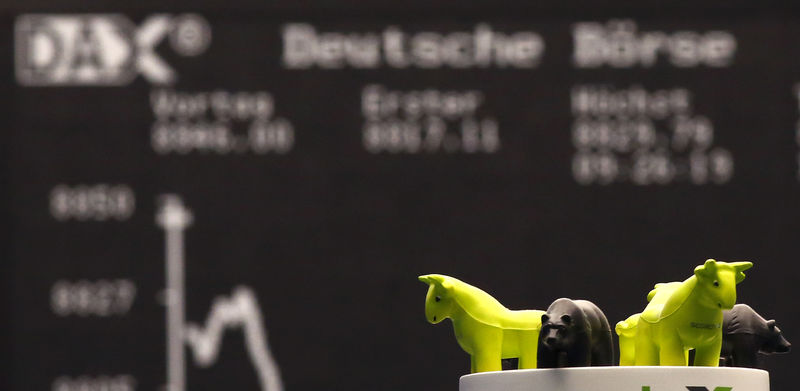Bill Gross warns on gold momentum as regional bank stocks tumble
Investing.com - European stocks fell sharply Friday, tracking overnight losses on Wall Street following concerns over the health of U.S. regional banks, ahead of the release of key inflation data.
At 03:10 ET (07:10 GMT), the DAX index in Germany dropped 2%, the CAC 40 in France slipped 1.1% and the FTSE 100 in the U.K. fell 1.5%.
The major U.S. stock indexes closed lower on Wednesday, fueled by a significant decline in bank stocks late in the session. The Dow Jones Industrial Average lost over 300 points, or 0.7%, while the S&P 500 and the NASDAQ Composite settled down 0.6% and 0.5%, respectively.
Banking sector in focus
The European banking sector is in the spotlight Friday after U.S. regional banks Zions Bancorporation (NASDAQ:ZION), Jefferies Financial Group (NYSE:JEF) and Western Alliance Bancorporation (NYSE:WAL) disclosed a series of bad loans on Thursday, raising concerns over rising credit risks in the sector.
The U.S. banking sector has seen several high-profile bankruptcies since 2023, and these developments have sparked further concerns, particularly given the broader uncertainty over the strength of the U.S. economy.
There are more U.S. regional banks, including Comerica (NYSE:CMA) and Fifth Third Bancorp (NASDAQ:FITB), due to report earnings later in the session, while, in Europe, Norion Bank (ST:NORION) reported a 10% increase in net profit for the third quarter and said its board plans to launch a new share buyback program.
Eurozone CPI data due
Elsewhere, consumer price inflation in the eurozone in September is expected to be confirmed at 2.2% on an annual basis, matching the earlier flash estimate, just above the European Central Bank’s 2.0% medium term target.
The ECB has cut interest rates by two percentage points in the year to June but has been on hold ever since, arguing that inflation was now roughly at target and there was no urgency in adjusting rates further.
It is widely expected to keep rates unchanged at its next meeting at the end of this month.
French political instability
French Prime Minister Sebastien Lecornu survived two no-confidence votes on Thursday, reducing the likelihood of an early election, but this has come to a severe political cost to President Emmanuel Macron’s government, as he has been forced to shelve the only major economic reform of his second term.
His concession, delaying the reform until after the 2027 presidential election, was made as a last-ditch attempt to prevent the collapse of Lecornu’s weak minority government.
The move will have long-term consequences, with auditors saying the delay will result in an E13 billion annual hole in the public finances by 2035 if it’s not undone after 2027.
Pearson sees Q3 sales growth
In corporate news, Pearson (LON:PSON) reported third-quarter sales growth of 4%, taking growth for the first nine months of the year to 2%. The education company flagged stronger growth ahead in the fourth quarter, citing favourable unit dynamics and continued traction in its digital offerings.
Swedish truckmaker Volvo (ST:VOLVb) reported a third-quarter operating profit in line with market expectations, even as weaker demand in North and South America weighed on the results.
Luxury company Hermes (EPA:HRMS) confirmed that Veronique Nichanian, artistic director of menswear styles, is departing after 37 years at the brand, while Bild reported that Porsche ’s (ETR:PSHG_p) supervisory board has agreed on a successor for CEO Oliver Blume at the auto giant.
Crude dips on Ukraine peace talks
Oil prices slipped lower Friday after U.S. President Donald Trump and Russian President Vladimir Putin agreed to meet and discuss ending the Ukraine war.
Brent futures dropped 0.8% to $60.60 a barrel, and U.S. West Texas Intermediate crude futures fell 0.8% to $57.01 a barrel.
Both contracts were down nearly 3% on a weekly basis, falling to their weakest level since early May after Trump and Putin agreed to another summit on the war in Ukraine, with the meeting expected to be held within the next two weeks in Budapest.
Crude prices have also been battered by concerns over sluggish demand and a looming supply glut, while a build in U.S. inventories also weighed.
